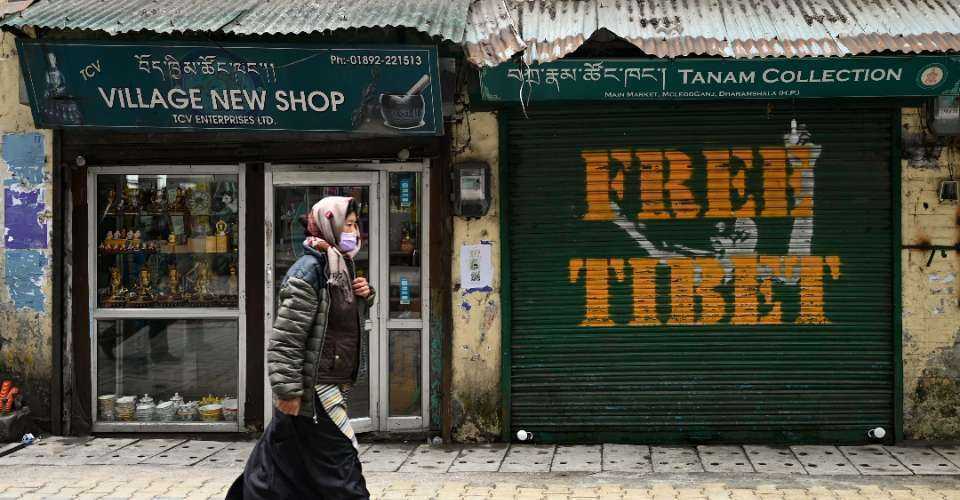
A woman walks past a closed shop with the message 'Free Tibet' written on it, in McLeod Ganj near Dharamsala in India on Feb. 20. (Photo: AFP)
Tibetans have welcomed a bipartisan bill passed in the United States Senate urging the Chinese government to engage in dialogue with the Dalai Lama or Tibetan leaders to resolve the China-Tibet dispute.
Resolution to the Tibet-China Dispute Act unanimously passed on May 23 called for dispute resolution following international law, including the United Nations Charter, by peaceful means and through dialogue, Radio Free Asia (RFA) reported.
Also known as the Resolve Tibet Act, the bill has some changes that need approval from the House of Representatives and must go to US President Joe Biden, who is likely to sign it into law.
Tencho Gyatso, president of the International Campaign for Tibet, welcomed the bill saying that it was an indication of the unwavering American support for Tibet and a firm rebuttal to China’s false narrative about Tibet.
“I hope Beijing will now see that disputes must be resolved through negotiations instead of its agenda to erase Tibet’s unique and ancient civilization,” Gyatso said.
The bill calls on China to “cease its propagation of disinformation about the history of Tibet, the Tibetan people, and Tibetan institutions, including that of the Dalai Lama,” RFA reported.
The bill also empowers the US State Department to counter disinformation on Tibet.
In a statement, Senator Jeff Merkley, an Oregon Democrat, and one of the co-authors of the bill said that it was a “direct response” to China, “which continues to trample on the fundamental rights of the Tibetan people.”
“We will work to get it to President Biden’s desk to help put the people of Tibet in charge of their own future,” Merkley said.
The bill reaffirms that Tibet includes the Tibetan-populated regions of Gansu, Qinghai, Sichuan, and Yunnan provinces, in addition to the Tibet Autonomous Region, thus challenging China’s claim that Tibet is restricted to that latter region alone.
Senator Todd Young, an Indiana Republican, and another co-sponsor, urged for more push from the US towards negotiating the China–Tibet issue.
The US must “push for negotiations that advance freedoms for the Tibetan people and peaceful resolution to the [Chinese Communist Party’s] conflict with the Dalai Lama,” Young said.
The Chinese authorities are yet to respond publicly to the bill. The Chinese Embassy in Washington had not responded to a request for comment, RFA reported.
Namgyal Choedup, a representative of the Dalai Lama and the Central Tibetan Administration to North America, said that the bill’s unanimous passage was a clear message to China.
The bill “sends a clear message that China’s systematic oppression and erasure of Tibetan identity is never the answer to resolving the Tibet-China dispute and we are hopeful that this will soon become law,” Choedup said.
China invaded Tibet in 1950 and has been in control of the territory ever since.
Following a failed uprising against Tibet in 1959, Tibetan Buddhism’s supreme leader the Dalai Lama fled into exile and took refuge in Dharamshala, India.
Beijing alleges that the Dalai Lama intends to split off the Tibet Autonomous Region and other Tibetan-populated areas in China’s Sichuan, Qinghai, Yunnan, and Gansu provinces from the rest of the country.
However, the Dalai Lama has consistently advocated a ‘Middle Way,’ which accepts Tibet’s status as a part of China and urges greater cultural and religious freedoms.
The Dalai Lama has also advocated for strengthened language rights that are guaranteed for ethnic minorities under China’s constitution.
Beijing has, however, sought to legitimize Chinese rule through the suppression of dissent and policies undermining Tibetan culture and language, RFA reported.


